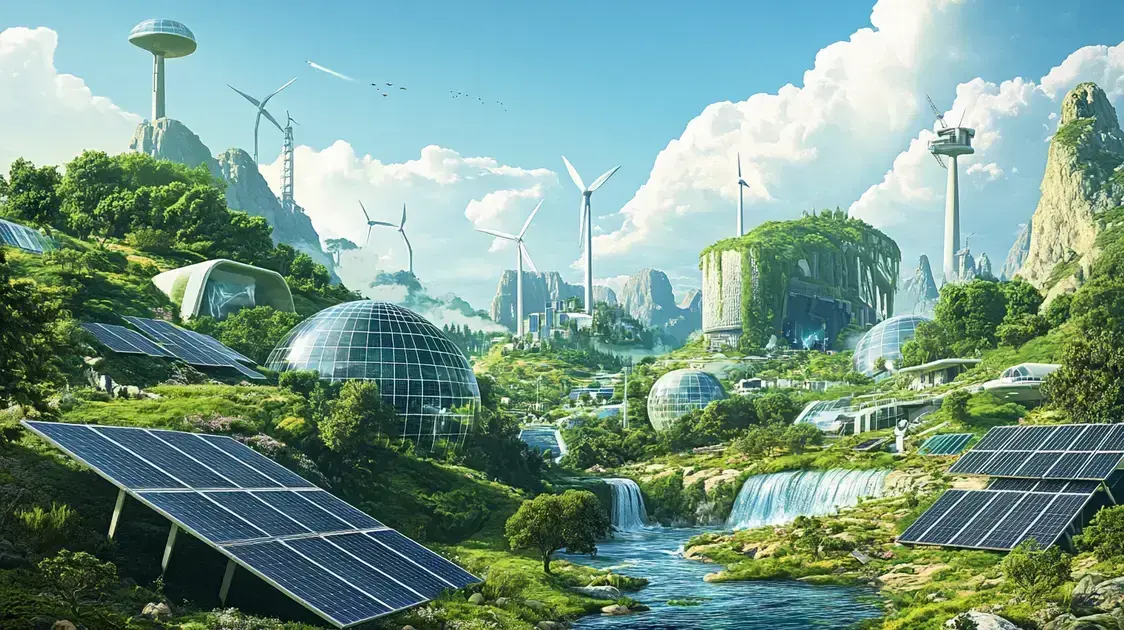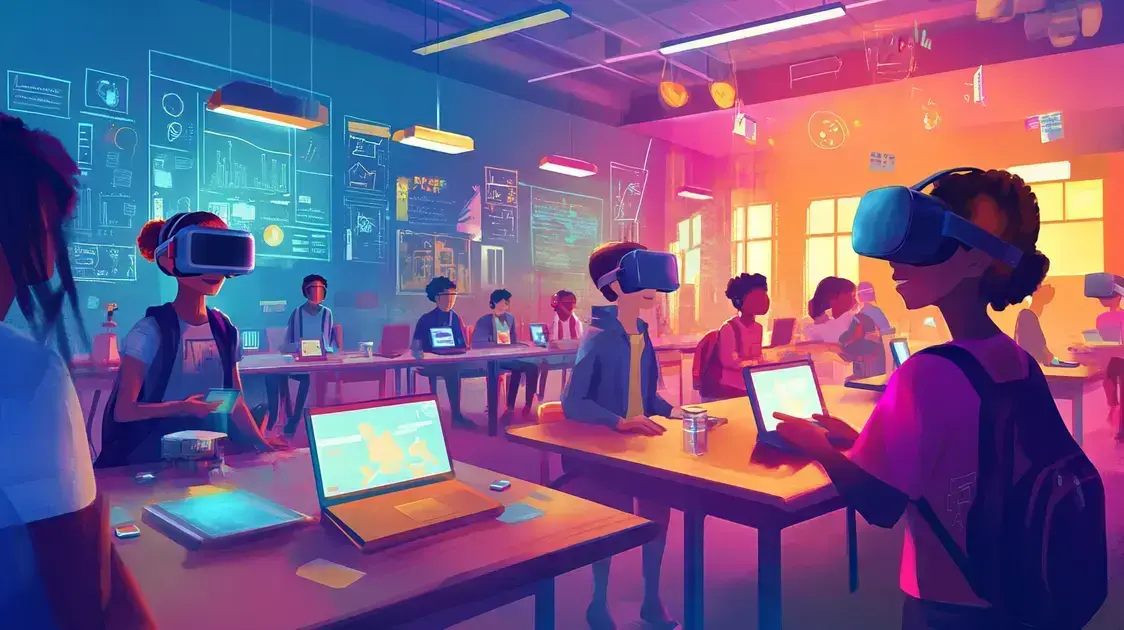Future innovations are set to revolutionize various aspects of our lives, from healthcare to education. Advancements in technology continue to reshape industries, improving efficiency and creating new opportunities. Staying informed about these changes is essential to understanding their potential impact.
From artificial intelligence to smart automation, future innovations are driving progress at an unprecedented pace. Breakthroughs in medicine, sustainable energy, and digital transformation are shaping a world where convenience and sustainability go hand in hand. These developments promise to enhance both personal and professional experiences.
Exploring future innovations allows us to anticipate changes and adapt to an evolving world. Keep reading to discover the latest advancements and how they can improve daily life in remarkable ways.
Understanding Future Innovations
Understanding future innovations is essential as they shape our lives and the world around us. These innovations often embody cutting-edge technology that can significantly enhance how we live, work, and interact. They can be found in various sectors, including healthcare, education, transportation, and sustainable energy.
The Importance of Future Innovations
Future innovations play a crucial role in addressing global challenges. They have the potential to solve pressing issues like climate change, health crises, and resource scarcity. By leveraging advanced technologies, we can create solutions that not only improve quality of life but also contribute to a more sustainable future.
Areas of Focus
Some of the areas incorporating future innovations include:
- Artificial Intelligence: AI technologies automate processes, enhance decision-making, and improve efficiencies.
- Renewable Energy: Innovations in solar, wind, and other renewable sources are vital for a sustainable future.
- Healthcare: Telemedicine, wearable technologies, and personalized medicine are revolutionising patient care.
- Education: Technology-driven educational tools create more interactive and engaging learning environments.
- Transportation: Innovations in electric vehicles and smart public transport solutions help reduce our carbon footprint.
The Future Landscape
The future landscape of innovation is rapidly evolving. With advancements in technology, our daily lives are becoming more connected and efficient. However, understanding the implications and societal impacts of these innovations is essential to ensure that progress benefits everyone.
In conclusion, as we delve deeper into this fascinating world of future innovations, we can look forward to exciting developments that will shape our world in unimaginable ways. Each advancement presents not only opportunities but also challenges that we must thoughtfully navigate.
The Role of AI in Future Innovations
The role of AI in future innovations is pivotal, influencing numerous sectors and enhancing the way we live and work. From healthcare to education, artificial intelligence (AI) is revolutionising industries by introducing efficiency and new capabilities.
Enhancing Decision-Making
AI systems analyse vast amounts of data far quicker than any human could. By processing and interpreting data, they can provide insights that improve decision-making. For example, in healthcare, AI can help doctors identify diseases earlier than standard methods.
Automating Processes
Many repetitive tasks can be automated through AI, freeing up valuable time for employees. In sectors like manufacturing, robots driven by AI can work alongside humans to increase efficiency and reduce error rates in production.
Customising User Experiences
AI plays a significant part in personalising user experiences. For instance, e-commerce platforms utilise AI to recommend products based on past purchases and browsing history, making shopping more convenient and enjoyable for customers.
Improving Safety
AI also contributes to safety enhancements. In transportation, AI systems help in developing self-driving cars that can reduce accidents by making real-time decisions that improve road safety.
Supporting Sustainable Innovations
By optimizing resource use, AI can help in crafting sustainable innovations. Smart grids, which manage electricity demand and supply more efficiently, showcase how AI can be employed to support environmental sustainability.
Expanding Learning Options
In education, AI can provide tailored learning experiences. Being able to adapt to individual learning styles ensures that students receive the support they need to succeed, making education more effective and accessible.
Overall, the role of AI in future innovations is crucial, as it drives progress and enhances the quality of life globally. The exciting possibilities that AI brings to various sectors will continue to unfold, shaping our future in remarkable ways.
Sustainable Technologies for Future Innovations

Sustainable technologies for future innovations are essential for addressing the pressing challenges of climate change and resource depletion. These technologies aim to create systems that are not only efficient but also environmentally friendly, ensuring a sustainable future for the next generations.
Renewable Energy Sources
Renewable energy is at the forefront of sustainable technologies. This includes sources like solar, wind, and hydroelectric power. By harnessing these natural resources, we can reduce our reliance on fossil fuels and decrease greenhouse gas emissions.
Energy-efficient Systems
Implementing energy-efficient technologies in homes and industries can significantly lower energy consumption. Smart devices and systems optimise energy use, providing benefits such as lower utility bills and a reduced carbon footprint.
Green Building Practices
Construction practices are evolving to incorporate sustainable materials and designs. Green buildings use resources wisely and aim for energy efficiency, often featuring solar panels, green roofs, and rainwater harvesting systems.
Waste Management Innovations
Innovative waste management technologies are crucial for promoting recycling and reducing landfill waste. Advanced sorting technologies and composting systems facilitate the recycling of materials, minimizing environmental impact.
Sustainable Agriculture
Agricultural practices are also shifting towards sustainability. Techniques such as vertical farming and permaculture use fewer resources while increasing food production, combatting food scarcity in urban areas.
Water Conservation Technologies
Innovations in water conservation strive to efficiently manage this vital resource. Technologies such as low-flow fixtures and smart irrigation systems help reduce water waste in agriculture and urban settings.
Adopting these sustainable technologies is crucial for future innovations, as they offer practical solutions to global challenges while promoting environmental health and economic sustainability.
Future Innovations in Healthcare
Future innovations in healthcare are set to transform the way we approach medical treatment and patient care. With advancements in technology, the healthcare industry is improving its ability to diagnose, treat, and manage diseases effectively.
Telemedicine
Telemedicine has gained prominence, allowing patients to consult healthcare professionals from the comfort of their homes. This innovation is especially valuable for those in remote areas, making healthcare more accessible and reducing the need for travel.
Wearable Health Technology
Wearable devices, such as fitness trackers and smartwatches, monitor vital signs and activity levels. These tools empower individuals to take control of their health, providing real-time insights into their well-being and encouraging proactive health management.
AI and Machine Learning
Artificial intelligence (AI) is enhancing diagnostics and treatment plans. By analysing vast amounts of patient data, AI can identify patterns and predict outcomes, aiding healthcare providers in making informed decisions tailored to individual patients.
Personalised Medicine
Personalised medicine tailors treatments to each patient’s unique genetic makeup. This approach ensures that medications and therapies are more effective while minimizing side effects, leading to better patient outcomes.
Robotic Surgery
Robotic technology is becoming increasingly common in surgical procedures. Robots assist surgeons in performing complex operations with heightened precision, which can lead to quicker recovery times and reduced risks of complications.
Virtual Reality (VR) in Therapy
VR technology is being implemented in therapeutic settings, such as pain management and PTSD treatment. By creating immersive environments, VR can help patients confront and manage their fears in a controlled manner.
As these and other future innovations in healthcare develop, they promise to create a more efficient and effective system that not only improves health outcomes but also enhances the patient experience.
Transportation Advancements and Future Innovations
Transportation advancements and future innovations are transforming the way we move people and goods. As technology evolves, new solutions emerge to address old challenges, making travel safer, faster, and more efficient.
Electric Vehicles (EVs)
Electric vehicles are at the forefront of transportation advancements. With decreasing battery costs and increasing charging infrastructure, EVs offer a greener alternative to traditional petrol and diesel cars. These vehicles produce fewer emissions and contribute to reduced air pollution.
Autonomous Vehicles
Self-driving cars are quickly becoming a reality. Using sensors, cameras, and AI, these vehicles can navigate and drive without human intervention. This technology is expected to reduce accidents and improve traffic flow.
High-speed Rail Systems
Future innovations in high-speed rail systems aim to connect cities more efficiently. Trains powered by electricity can travel at speeds exceeding 300 km/h, significantly reducing travel times between major urban areas.
Hyperloop Technology
Hyperloop systems promise to revolutionise transportation by using magnetic levitation to transport pods through low-pressure tubes at high speeds. This mode of transport could potentially halve journey times for long-distance travel.
Smart Transportation Systems
Smart cities are incorporating technology to manage traffic flow, reduce congestion, and enhance public transportation. Real-time data helps optimise routes and inform users about delays, making commuting more efficient.
Delivery Drones
Innovations in drone technology allow for the delivery of packages directly to consumers’ doorsteps. This method reduces the need for delivery trucks and shortens wait times for online orders, showcasing efficiency in logistics.
As advancements in transportation continue to develop, we can expect remarkable changes that will redefine how we interact with our environment and enhance our overall travel experience.
Future Innovations in Education

Future innovations in education are reshaping the way we learn and teach. With the integration of technology and new methodologies, education is becoming more accessible, engaging, and tailored to individual needs.
Personalised Learning Experiences
Advancements in educational technology enable personalised learning experiences. Adaptive learning platforms use AI to assess students’ strengths and weaknesses, adjusting content and pace to fit each learner’s unique needs.
Virtual and Augmented Reality
Virtual reality (VR) and augmented reality (AR) create immersive educational environments. Students can explore historical sites, conduct virtual science experiments, and engage in interactive lessons, making learning more dynamic and memorable.
Online Learning Platforms
Online learning platforms, such as MOOCs (Massive Open Online Courses), provide access to a wealth of resources and expertise. Learners from diverse backgrounds can take courses from top universities globally, democratizing education.
Gamification of Learning
Incorporating game elements into educational content motivates students to engage more actively. This gamification approach enhances problem-solving skills and encourages collaboration among learners.
AI Tutors and Assistants
Artificial intelligence is revolutionising tutoring. AI assistants can provide immediate support, answering questions and offering explanations, allowing teachers to focus on more complex student needs and enhancing classroom management.
Collaborative Learning Environments
Future innovations foster collaborative learning through online tools and platforms. Students can work together on projects, share ideas, and learn from each other’s perspectives, enhancing interpersonal skills and teamwork.
With these innovations, education is evolving rapidly, promoting a more inclusive, interactive, and effective learning environment that prepares students for future challenges.
The Impact of Future Innovations on Society
The impact of future innovations on society is profound, influencing various aspects of our daily lives. As we embrace new technologies and methodologies, the way we interact, work, and learn evolves, leading to widespread changes.
Improved Quality of Life
Future innovations aim to enhance the quality of life for individuals. Breakthroughs in healthcare technology, for example, lead to better treatments and improved mental and physical health, allowing people to live longer and healthier lives.
Job Market Evolution
The introduction of advanced technologies often leads to shifts in the job market. While some jobs may become obsolete, new roles emerge, necessitating new skills. Workers must adapt to these changes, which can foster a culture of lifelong learning and development.
Environmental Awareness
Innovations focused on sustainability help raise environmental awareness. Technologies such as renewable energy sources and green building practices encourage society to consider ecological impacts, fostering a culture that prioritises environmental responsibility.
Increased Accessibility
Future innovations in technology are making life more accessible for people with disabilities. Assistive technologies and adaptive devices can help individuals participate more fully in society, enhancing social inclusion and equality.
Community Engagement
Online platforms and social media allow individuals to engage with communities worldwide. This connectivity promotes collaboration, as people can share ideas and resources beyond geographical boundaries, leading to a more cohesive global society.
Ethical Considerations
The rapid pace of technological advancements raises ethical questions about privacy, data security, and the implications of AI. Society must grapple with these challenges to ensure that innovations benefit everyone without compromising individual rights.
As we move forward, the impact of future innovations on society will continue to shape our world. Understanding these effects is crucial for harnessing the power of innovation to create a better tomorrow.
Preparing for Future Innovations
Preparing for future innovations is essential as we navigate an ever-changing world. To adapt successfully, individuals and organisations must embrace continuous learning and flexibility.
Investing in Education and Skills
To prepare for future innovations, it is crucial to invest in education and skill development. Lifelong learning initiatives can help individuals stay updated with new technologies and methodologies, ensuring they remain competitive in their fields.
Embracing Technology
Being open to adopting new technologies is vital. Individuals and businesses should integrate tools like AI, machine learning, and data analytics into their workflows. This approach enhances productivity and efficiency.
Fostering a Culture of Innovation
Creating an environment that encourages creativity and experimentation is important. Businesses should promote brainstorming sessions and innovation workshops to help teams generate new ideas and solutions.
Building Collaborative Networks
Networking with other professionals and organizations can provide valuable insights into emerging trends. Collaborative partnerships foster knowledge sharing and can lead to joint innovations that benefit all parties involved.
Staying Informed about Trends
Regularly following industry news, attending conferences, and participating in webinars can help individuals and organisations stay informed about future innovations. Understanding trends can guide strategic planning and decision-making.
Adapting to Change
Flexibility and adaptability are essential when preparing for change. Those open to adjusting their approaches and strategies can better navigate disruptions and seize new opportunities that arise.
By taking proactive steps to prepare for future innovations, individuals and organisations can thrive in a dynamic landscape, positioning themselves for success in the years ahead.
Embracing Future Innovations
The exploration of future innovations reveals a transformative journey across various sectors, from healthcare and education to transportation and environmental sustainability. These advancements not only enhance efficiency and accessibility but also elevate the quality of life for individuals and communities.
As we prepare for the changes on the horizon, it becomes imperative to invest in education, foster a culture of innovation, and embrace collaborative efforts. With the right mindset and tools, we can navigate the complexities of tomorrow’s landscape.
Ultimately, embracing these innovations allows us to unlock new possibilities, creating a society that is equipped to thrive in an ever-evolving world.
Check out our article on Fintech Innovations to explore how new technologies are revolutionizing the financial services industry.
